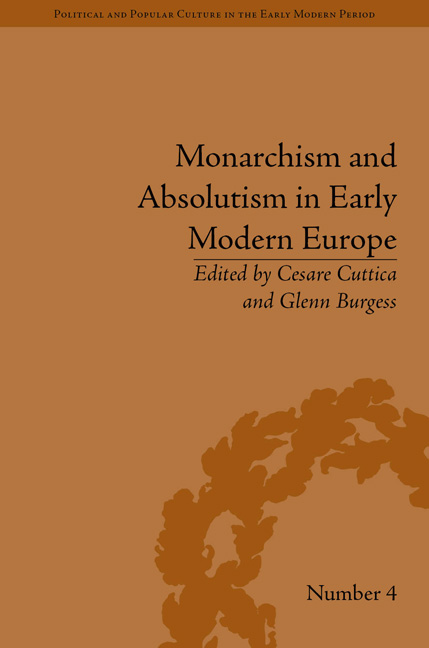Book contents
- Frontmatter
- CONTENTS
- Acknowledgements
- List of Contributors
- Introduction: Monarchism and Absolutism in Early Modern Europe
- Part I Royalists, Republicans, Patriarchalists: English Thinkers at Odds in the Seventeenth Century
- 1 A Culture of Political Counsel: The Case of Fourteenth-Century England's ‘Virtuous’ Monarchy vs Royal Absolutism and Seventeenth-Century Reinterpretations
- 2 Royalist Absolutism in the 1650s: The Case of Robert Sheringham
- 3 Patriarchalism and the Monarchical Republicans
- Part II Absolutism, Cynicism, Patriotism: Eighteenth-Century Enlightenment Reflections
- Part III Absolutism, Monarchism, Despotism in Theory and Practice: Contested Historiography and Comparative Approach
- Part IV Monarchy, the State of Nature, Religion and Iconography in European Perspective
- Notes
- Works Cited
- Index
3 - Patriarchalism and the Monarchical Republicans
from Part I - Royalists, Republicans, Patriarchalists: English Thinkers at Odds in the Seventeenth Century
- Frontmatter
- CONTENTS
- Acknowledgements
- List of Contributors
- Introduction: Monarchism and Absolutism in Early Modern Europe
- Part I Royalists, Republicans, Patriarchalists: English Thinkers at Odds in the Seventeenth Century
- 1 A Culture of Political Counsel: The Case of Fourteenth-Century England's ‘Virtuous’ Monarchy vs Royal Absolutism and Seventeenth-Century Reinterpretations
- 2 Royalist Absolutism in the 1650s: The Case of Robert Sheringham
- 3 Patriarchalism and the Monarchical Republicans
- Part II Absolutism, Cynicism, Patriotism: Eighteenth-Century Enlightenment Reflections
- Part III Absolutism, Monarchism, Despotism in Theory and Practice: Contested Historiography and Comparative Approach
- Part IV Monarchy, the State of Nature, Religion and Iconography in European Perspective
- Notes
- Works Cited
- Index
Summary
Introduction: The Monarchical Republic
It is by now well established that the early modern English monarchy had republican elements. Seminal work by Patrick Collinson on the ‘monarchical republic’ of Elizabethan England has emphasized the self-governing capacities of early modern Englishmen, be they members of the Privy Council or local officeholders. Collinson has shown that the political consciousness of Elizabeth's subjects was so strong that William Cecil, Lord Burghley, could even envisage bridging a possible interregnum after the Queen's death without affecting the working of the administration. Mark Goldie, meanwhile, has given us estimates of numbers suggesting that some 50,000 parish officers were running the country at any one time over the course of the seventeenth century. As members of an ‘unacknowledged republic’, churchwardens, constables, overseers and other parish officials showed considerable scope for political participation. In terms of political theory, Markku Peltonen has pointed out that republican ideals, such as ‘civic awareness’, were already present in classical humanist thought long before anyone contemplated regicide, and that the use of ‘classical humanist vocabulary’ and ‘republican features of early modern English political thinking’ continued into the seventeenth century. The literary scholar David Norbrook has similarly identified a ‘fundamental continuity between the post-1649 writings of poets sympathetic to the republic and their earlier works’. The execution of Charles I after the Civil War, it seems, was not the great turning point for English republican thought it had once been considered as.
- Type
- Chapter
- Information
- Monarchism and Absolutism in Early Modern Europe , pp. 47 - 60Publisher: Pickering & ChattoFirst published in: 2014



